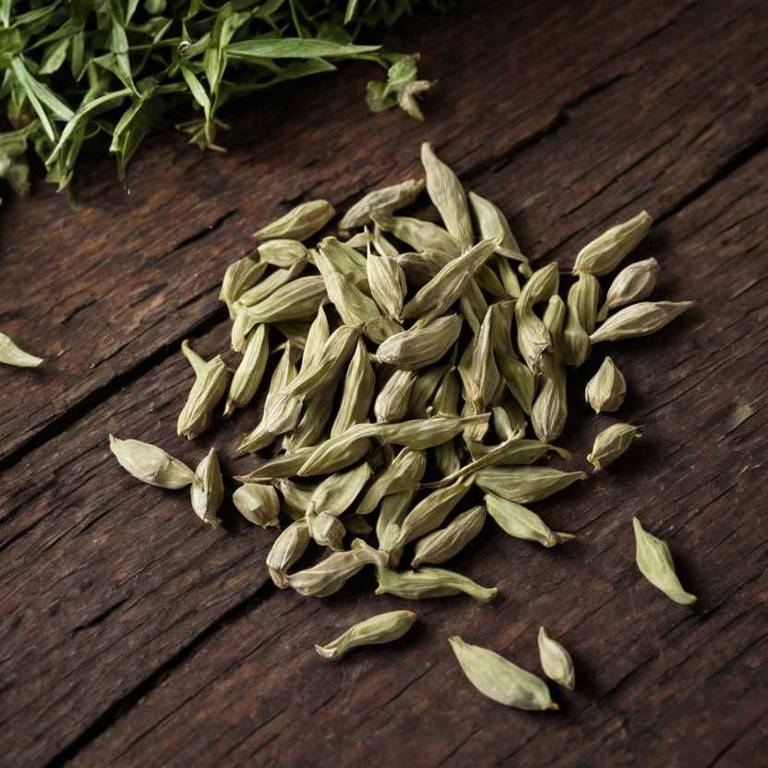By Leen Randell
Updated: Jul 20, 2024
10 Medicinal Constituents Of Elettaria Cardamomum (Cardamom)

Elettaria cardamomum has active constituents such as volatile oils, flavonoids, and terpenes.
These constituents possess medicinal properties like anti-inflammatory, antioxidant, and antimicrobial effects. For instance, cardamom's volatile oils can help alleviate digestive issues and respiratory problems, while its flavonoids can improve cardiovascular health.
The terpenes, particularly limonene, have been shown to exhibit anti-cancer properties, thereby improving quality of life for individuals suffering from chronic diseases.
This article explains in details the 10 best active constituents of Elettaria cardamomum.
1. Cineole
Elettaria cardamomum cineole is a key constituent of its essential oil.
Cineole is a natural monoterpene alcohol with a sweet, pungent aroma and is responsible for the distinct flavor and fragrance of cardamom. It has been traditionally used in herbal medicine and aromatherapy to alleviate digestive issues, reduce stress, and promote relaxation.
Its antimicrobial properties also make it effective against various types of infections and diseases.
2. Alpha-terpineol
Elettaria cardamomum alpha-terpineol is a key compound responsible for its distinctive aroma and flavor.
This monoterpene is found in the essential oil of cardamom seeds and is responsible for its sweet, minty, and slightly spicy scent.
Alpha-terpineol has been shown to possess numerous medicinal properties, including antimicrobial and anti-inflammatory effects, making it a popular ingredient in traditional medicine and aromatherapy practices.
3. Beta-pinene
Elettaria cardamomum beta-pinene is a monoterpene compound found in its essential oil.
This compound contributes to the unique aroma and flavor of cardamom, commonly used in Indian and Middle Eastern cuisine.
Beta-pinene has been studied for its potential health benefits, including anti-inflammatory, antioxidant, and antibacterial properties, making it a popular ingredient in natural remedies and herbal products.
4. Camphor
Elettaria cardamomum camphor is a naturally occurring essential oil extracted from the seeds of the cardamom plant.
It has been used for centuries in traditional medicine and cooking due to its unique aroma and therapeutic properties.
Camphor has a sweet, spicy, and slightly minty scent and is often used in perfumes, aromatherapy, and as a flavoring agent in foods and beverages.
5. Linalool
Elettaria cardamomum linalool is a naturally occurring compound found in the essential oil of this spice.
It is a sweet-smelling and colorless liquid that contributes to the distinctive aroma and flavor of cardamom. Linalool has been traditionally used in aromatherapy to promote relaxation, reduce stress, and improve sleep quality.
Its calming properties make it an effective ingredient in skincare products and perfumes as well.
6. Geraniol
Elettaria cardamomum geraniol is a type of essential oil extracted from the seeds of the cardamom plant.
This natural oil has been used for centuries in traditional medicine and aromatherapy due to its numerous health benefits, including digestive aid, stress relief, and antimicrobial properties. Geraniol oil also possesses a sweet, floral scent that can be used in perfumery and cosmetics.
It is commonly blended with other essential oils to enhance their therapeutic effects.
7. Limonene
Elettaria cardamomum limonene is a natural chemical compound that plays a crucial role in the aroma and flavor of cardamom.
It is a monoterpene, a type of organic compound found in the essential oil of cardamom seeds.
Limonene is responsible for the characteristic sweet, citrusy, and slightly minty scent of cardamom, making it a popular ingredient in aromatherapy and culinary applications.
8. Beta-caryophyllene
Elettaria cardamomum beta-caryophyllene is a sesquiterpene compound found in high concentrations within its essential oil.
This natural chemical has been extensively researched for its potential health benefits, including anti-inflammatory and antioxidant properties.
Additionally, beta-caryophyllene has shown promise in relieving anxiety and stress, making it a sought-after ingredient in the production of herbal remedies and aromatherapy products.
9. Pinocarveol
Elettaria cardamomum pinocarveol is a bioactive compound found in the essential oil of this spice plant.
Pinocarveol has been isolated and identified as one of the major constituents responsible for its aromatic properties.
It is known to possess various biological activities, including antioxidant, anti-inflammatory, and antimicrobial properties, making it a potential natural product with therapeutic applications.
10. Alpha-pinene
Elettaria cardamomum alpha-pinene is a terpenoid compound that is present in its essential oil.
It is a natural monoterpene, accounting for approximately 25-30% of the oil's composition. Alpha-pinene has been shown to possess antimicrobial, antioxidant, and anti-inflammatory properties, making it useful in traditional medicine and as a natural preservative.
Its aroma is also commonly used in aromatherapy and perfumery applications.